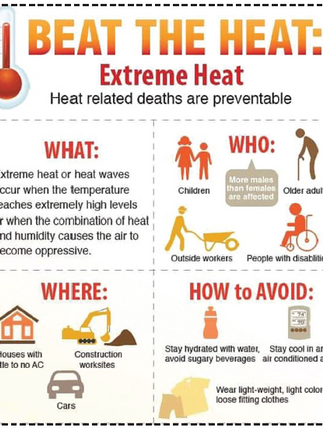According to the US National Weather Service, a series of high-pressure areas is driving temperatures up to “record challenging levels” in the western US, and the heat wave is having major impacts on the local communities here in Southern Utah and Northern Arizona. The weather service predicts consistent temperatures in the triple digits in the coming days, and with the heavy rains this winter and spring, that temperature is likely to be paired with oppressive humidity as well.
Images courtesy of Fredonia Fire Department.
Local fire prevention services are releasing some recommendations of practices to protect vulnerable individuals and pets from the heat, in addition to consistent urging for fire safety and care. Some best practices from safety officials include:
Stay hydrated. Drink plenty of water and high electrolyte drinks, and avoid sugary drinks like soda.
Don’t leave anyone in an unattended car. Temperatures can be devastating inside of a sealed container like a closed car, and strained air conditioning systems are prone to failure. Don’t leave children or pets unattended in a car, even with “the windows cracked and the AC on.”
Wear light colored and loose-fitting clothing. Clothing that gives your skin space to sweat can help keep you cool. Light colored clothing has less of a tendency to heat up. Wear clothing that covers your skin if you can, to prevent direct exposure to sunlight.
Be aware of high-risk circumstances. People who work primarily outdoors, especially heavy labor, senior citizens, children and dogs are all at risk of being more negatively affected by exposure to the heat. Be aware that even if you are coping well and managing the heat, those who are with you may be less resilient - do not take dogs on extended hikes in the heat.
Know local spots where you can cool off. Homes with older air conditioning systems or no air conditioning at all may be rendered inhospitable by high temperatures. Consider public areas where you can keep cool during the day if you need to leave your home, like the public library or pool. This can also lighten the heavy load placed on the local power infrastructure if fewer homes require air conditioning during the hottest hours of the day.
Wear sunscreen outdoors. In the direct summer sun, skin damage doesn’t take long. Sunscreen of SPF 30 and above will help protect you from sunburn and the associated increases in cancer risk. Be extra aware of those with sensitive skin like young children - not only are they more prone to skin damage, they also may require sunscreen made for kids.
As the temperatures increase, the flora in the area tends to dry out more significantly, and the high temperatures makes fighting fires more difficult and dangerous. Local Fire Departments urge citizens to be extra careful during the dry months; keep fires in safe and well-built fire pits, don’t light off fireworks and make sure controlled burns are authorized and supervised, if they are allowed at all.







